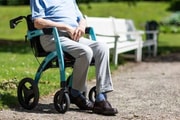Groundbreaking Study: Could Your Violent Dreams Predict Parkinson's Disease? Discover the Surprising Connection Now!
By
Danielle F.
- Replies 0
Dreams can be a window into the deepest recesses of our minds, often reflecting our subconscious thoughts and feelings. But what if they could also be a crystal ball, offering a glimpse into our future health? In a pioneering trial, researchers are delving into the possibility that violent dreams may be more than just a fleeting nightmare—they could be an early warning sign of Parkinson's disease.
The study, which is the first of its kind in the world, is investigating the link between dream-enacting behaviours during sleep and the risk of developing Parkinson's disease. This condition, which affects millions of people worldwide, is a progressive neurological disorder that can cause tremors, stiffness, and difficulty with balance and coordination.

John Clowes, a participant in the study, has experienced firsthand the unsettling phenomenon of acting out his dreams. 'I was starting to thrash around with my arms and legs in bed,' he shared. 'I'd wake up and could almost relive the dream. It was like a cheap Hollywood movie.' For Clowes, who has a family history of Parkinson's, these episodes were more than just disturbing—they were a red flag.
Researchers have identified that a condition known as REM sleep behaviour disorder (RBD), which is characterised by the physical enactment of dreams, is a significant indicator of potential neurological issues. Unlike sleepwalking, RBD occurs during the REM (rapid eye movement) stage of sleep, when the body is typically in a state of paralysis. However, in individuals with RBD, this paralysis does not occur, leading to the physical acting out of dreams.
The connection between RBD and Parkinson's disease is particularly striking. 'If we can't explain why somebody starts acting out their dreams after the age of 50, their chances of going on and getting Parkinson's disease, or a disease like Parkinson's, is 140 times greater than the average person in the population,' explained Professor Simon Lewis, a Macquarie University Professor of Cognitive Neurology.
In the trial, researchers are exploring whether a medication can target inflammation in the brain, which is believed to be a driving force behind the early stages of Parkinson's disease. 'We want to identify a pathway to a cure, so we're using a short exposure to a drug that we think will reduce the neuroinflammation,' said Professor Lewis.
The goal is to intervene early, potentially saving the brain's dopamine-producing cells before the onset of motor symptoms like tremors and walking difficulties. By the time these symptoms appear, it's estimated that half of these critical cells have already been lost.
For seniors, understanding the implications of such research is crucial. It's not just about the potential for early detection and intervention; it's about the quality of life and the ability to plan for the future. If violent dreams can indeed predict Parkinson's disease, it could open the door to new preventative treatments and provide peace of mind for those at risk.
As we await the results of this groundbreaking trial, it's important to remember that not all violent dreams are cause for concern. However, if you or a loved one is experiencing frequent, vivid dreams that involve acting out physically, it may be worth discussing with a healthcare professional.

Stay tuned for updates on this world-first trial, and remember, knowledge is power—especially when it comes to our health.
The study, which is the first of its kind in the world, is investigating the link between dream-enacting behaviours during sleep and the risk of developing Parkinson's disease. This condition, which affects millions of people worldwide, is a progressive neurological disorder that can cause tremors, stiffness, and difficulty with balance and coordination.

According to recent study, dreams may give off telltale signs about one's brain health. Image Credit: Pexels/SHVETS production
John Clowes, a participant in the study, has experienced firsthand the unsettling phenomenon of acting out his dreams. 'I was starting to thrash around with my arms and legs in bed,' he shared. 'I'd wake up and could almost relive the dream. It was like a cheap Hollywood movie.' For Clowes, who has a family history of Parkinson's, these episodes were more than just disturbing—they were a red flag.
Researchers have identified that a condition known as REM sleep behaviour disorder (RBD), which is characterised by the physical enactment of dreams, is a significant indicator of potential neurological issues. Unlike sleepwalking, RBD occurs during the REM (rapid eye movement) stage of sleep, when the body is typically in a state of paralysis. However, in individuals with RBD, this paralysis does not occur, leading to the physical acting out of dreams.
The connection between RBD and Parkinson's disease is particularly striking. 'If we can't explain why somebody starts acting out their dreams after the age of 50, their chances of going on and getting Parkinson's disease, or a disease like Parkinson's, is 140 times greater than the average person in the population,' explained Professor Simon Lewis, a Macquarie University Professor of Cognitive Neurology.
In the trial, researchers are exploring whether a medication can target inflammation in the brain, which is believed to be a driving force behind the early stages of Parkinson's disease. 'We want to identify a pathway to a cure, so we're using a short exposure to a drug that we think will reduce the neuroinflammation,' said Professor Lewis.
The goal is to intervene early, potentially saving the brain's dopamine-producing cells before the onset of motor symptoms like tremors and walking difficulties. By the time these symptoms appear, it's estimated that half of these critical cells have already been lost.
For seniors, understanding the implications of such research is crucial. It's not just about the potential for early detection and intervention; it's about the quality of life and the ability to plan for the future. If violent dreams can indeed predict Parkinson's disease, it could open the door to new preventative treatments and provide peace of mind for those at risk.
As we await the results of this groundbreaking trial, it's important to remember that not all violent dreams are cause for concern. However, if you or a loved one is experiencing frequent, vivid dreams that involve acting out physically, it may be worth discussing with a healthcare professional.
At the Seniors Discount Club, we're committed to keeping you informed about the latest health research that could impact your life. We encourage you to share your experiences and thoughts on this topic in the comments below. Have you or someone you know dealt with violent dreams or been diagnosed with RBD? Your insights could be invaluable to others in our community.
Key Takeaways
- A world-first trial is being conducted to understand the link between violent dreams and Parkinson's disease.
- Researchers are investigating if REM sleep behaviour disorder, which involves acting out dreams, could be a significant warning sign of Parkinson's.
- The trial explores whether a pill could combat brain inflammation, believed to be a key driver of early Parkinson's disease.
- The research aims to identify pathways to a cure, potentially saving brain cells years before the development of motor symptoms.







